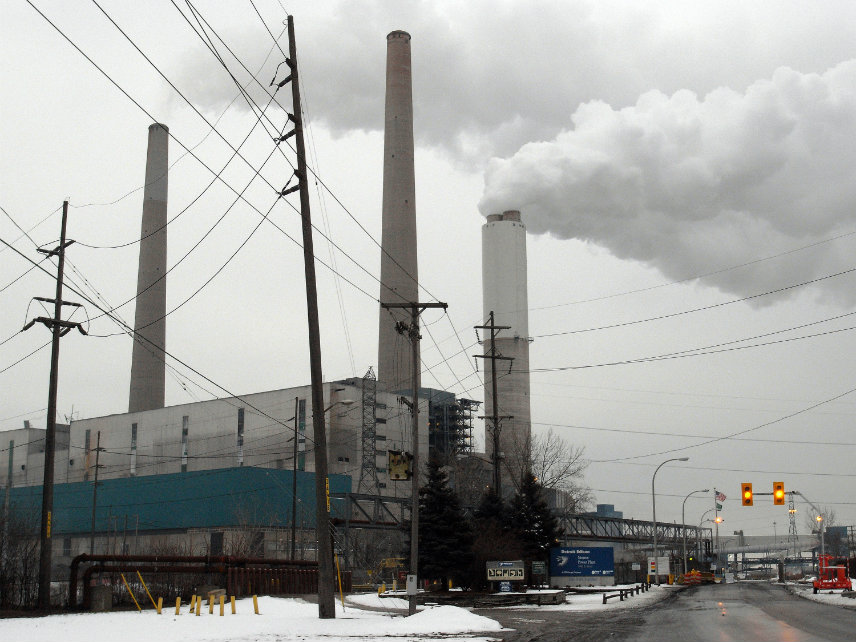The Republican Carbon Tax Bill Would Create Powerful Commission With Access to All Government Data
The "National Climate Commission" would institutionalize special interests that favor taxes to combat climate change.

Buried inside a carbon tax plan unveiled Monday by a Florida Republican is a plan to create a National Climate Commission and give it virtually unlimited access to government data on American businesses.
The National Climate Commission would meet once every three years, be staffed with a mix of academics and scientists "with expertise in the economy, energy, climate, or public health," and charged with setting new carbon tax rates "that reflect the latest scientific findings of what is needed to avoid serious human health and environmental consequences of a changing climate."
Opponents of carbon taxes are worried about the role the commission could play in future tax policy, and are raising red flags about potential privacy issues. On page 69 of the 71-page bill, the commission is granted authority to secure "unrestricted information" from "any executive department, bureau, agency, board, commission, office, independent establishment, or instumentality of the government." If the federal government has any information, it could be obtained by the members of the National Climate Commission.
"Potentially, there is a problem here because it doesn't say anything about confidential or proprietary business information," Marlo Lewis, a senior fellow at the Competitive Enterprise Institute, a free market think tank, tells Reason.
Lewis says that this omission could be intentional or inadvertent. It wouldn't be difficult to fix—an additional clause specifying that the commission would not have access to private information shared between companies and other government agencies for regulatory reasons would be enough to cover it, he says.
Rep. Carlos Curbelo (R-Fla.), who introduced the carbon tax—the Market Choice Act—to much fanfare on Monday, admitted his bill was unlikely to pass but said he was confident that legislation similar to it would become law someday.
"It will spark an important debate about investing in our country's infrastructure, the way we tax and what to do to protect the environment," he said in remarks Monday at the National Press Club.
The bill would repeal existing federal taxes on gasoline and aircraft fuels. In their place, it would introduce a $24-per-ton tax on industrial carbon-dioxide emissions. The tax would increase by 2 percent annually, with other adjustments possible depending on fluctuations in the consumer price index and national carbon emission goals outlined in the bill.
A carbon tax is not a fundamentally un-libertarian idea. Jonathan H. Adler, a professor at Case Western Reserve University School of Law (and Volokh Conspiracy contributor), has argued for the use of carbon taxes as part of a market-based approach to tackling climate change. "If the global atmosphere is a global commons owned by us all, why should not those who use this commons to dispose of their carbon emissions pay a user fee to compensate those who are affected," he wrote in a 2012 article for The Atlantic.
Properly applied, a carbon tax would have Americans paying for the full costs of their energy usage, rather than dumping those costs into the atmosphere to be dealt with by future generations. Certainly, that's a more market-oriented approach to the carbon problem than more heavy-handed approaches that require the government to ban certain industries or activities.
But Curbelo's bill reveals some of the difficulties in striking the right balance. Any carbon tax is likely to be a highly technocratic exercise, but how much power do you give the technocrats? And who might those technocrats be?
Curbelo's bill authorizes the commission to hire "experts and consultants," but that means "all of the left wing activist groups/NGOs/Soros types can get on the 'experts and consultants' gravy train, and all of their activist work is given an official government imprimatur," says John Kartch, vice president of communications for Americans for Tax Reform, which opposes the carbon tax proposal.
The creation of the National Climate Commission is likely not the most concerning aspect of Curbelo's bill. That honor would go to the fact that the carbon tax is likely to hike household energy bills by more than $600 annually—that's according to a Columbia University analysis of his proposal—or to the fact that the IRS would be authorized to impose massive penalties, up to 300 percent of the unpaid tax, on any person who "failed to comply with" the new tax.
To make matters worse, the National Climate Commission would incorporate pro-tax interests into the federal government while also giving global warming warriors access to any information they wanted from any American business. That seems like maybe not the best idea.
"A lot of lobbyists, a lot of consultants worked on this bill," says Lewis. "Would they be eligible to serve on the commission they helped create? That should be clarified."


Show Comments (116)